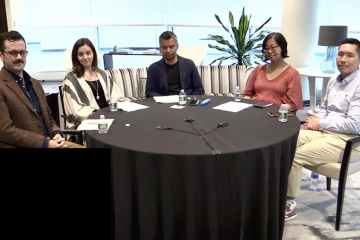Tufts Talks Openly
Creating and nurturing inclusive communities relies on inquiry, empathy, and discourse. Tufts Talks Openly invites students, faculty, and staff to engage in learning and dialogue across our differences so that together, we create the culture we need to produce relevant research, informed citizens, and responsible leaders who make the future brighter.
Programming
Featured Series
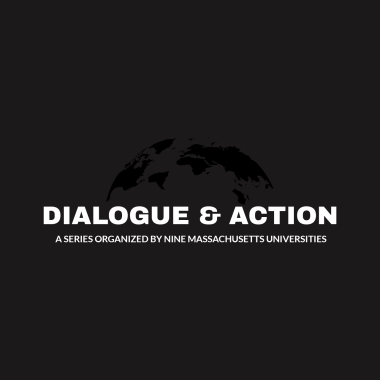
Dialogue & Action in an Age of Divides
This series features conversations among colleagues from across nine Massachusetts universities in the spirit of tackling difficult issues and modeling constructive dialogue. After each online panel, Tufts hosts a campus viewing and discussion event for community members to engage more deeply with the topics discussed.

Global Tufts Month 2024: Humanitarian Aid: Working Together in Times of Conflict
In times of conflict, complex emergencies, political instability, and environmental disasters, the Tufts community has consistently united to help with humanitarian aid programs that save lives, alleviate suffering, and preserve human dignity. Throughout March, events will spotlight initiatives aimed at alleviating the global impact of these challenges on well-being across various spheres.
Training Opportunities
Empathia Coaching: As part of our ongoing response to the conflict between Israel and Hamas, frontline staff and faculty can get coaching from a licensed master social worker about how to support distressed community members in ways that create a supportive university environment. These workshops are part of Tufts’ pilot partnership with Empathia, a global crisis management, counseling, and intervention leader.
Planning for Important and Sometimes Challenging Classroom Conversations: A Workshop in Two Parts: In this two-part workshop, facilitators will offer practical strategies for faculty who might feel unsure of how to engage students in meaningful and important classroom conversations. We will also provide a set of resources for those activities and others you can experiment with over time, and links to websites you can explore for more ideas.
Inclusive Teaching Seminar: Engaging in Difficult Conversations: Teaching and learning in 2024 has brought new challenges to conversations about diversity, equity, inclusion, and identity. Oftentimes, we are collectively experiencing criticism for both "doing too much" and "not doing enough" when it comes to engaging in difficult conversations. What are we to do? Join this interactive and practical workshop with Dr. Liza Talusan, author of The Identity Conscious Educator, to explore how identity informs and impacts our teaching and learning environments and how to build effective strategies for navigating these tensions in our professional and personal spaces.
Anti-Bias and Non-Discrimination Trainings: We are offering two anti-bias and non-discrimination trainings with sessions curated for faculty and staff audiences:
- On March 27, Dr. Amer F. Ahmed (Vice Provost for Diversity, Equity, and Inclusion at University of Vermont) will lead trainings focused on supporting our Arab, Muslim, Palestinian, and larger MENA (Middle East and North African) community.
- On March 26, facilitators from Project Shema will lead trainings on understanding antisemitism and creating an inclusive campus environment for our Jewish community. We will follow-up with the date and time of this offering.
Facilitating Inclusive and Responsive Dialogues: Learn how to effectively host and facilitate responsive conversations in order to foster inclusive learning and work environments. Through this 90-minute workshop, participants will receive strategies and resources for responding to critical flashpoints and for proactively addressing other diversity, equity, inclusion, justice, and access (DEIJA) related topics. This session is open to all Tufts community members but is especially designed for faculty, managers, and staff interested in holding space for inclusive and responsive dialogues within the classroom or workplace setting.
Anti-Bias and Non-Discrimination Trainings: We are offering two anti-bias and non-discrimination trainings with sessions curated for students:
- On March 27, Dr. Amer F. Ahmed (Vice Provost for Diversity, Equity, and Inclusion at University of Vermont) will lead trainings focused on supporting our Arab, Muslim, Palestinian, and larger MENA (Middle East and North African) community.
- On March 26, facilitators from Project Shema will lead trainings on understanding antisemitism and creating an inclusive campus environment for our Jewish community. We will follow-up with the date and time of this offering.
Empathia Coaching: As part of our ongoing response to the conflict between Israel and Hamas, frontline staff and faculty can get coaching from a social worker about how to support distressed community members in ways that create a supportive university environment. These workshops are part of Tufts’ pilot partnership with Empathia, a global crisis management, counseling, and intervention leader.
Anti-Bias and Non-Discrimination Trainings: We are offering two anti-bias and non-discrimination trainings with sessions curated for faculty and staff audiences:
- On March 27, Dr. Amer F. Ahmed (Vice Provost for Diversity, Equity, and Inclusion at University of Vermont) will lead trainings focused on supporting our Arab, Muslim, Palestinian, and larger MENA (Middle East and North African) community.
- On March 26, facilitators from Project Shema will lead trainings on understanding antisemitism and creating an inclusive campus environment for our Jewish community. We will follow-up with the date and time of this offering.
Facilitating Inclusive and Responsive Dialogues: Learn how to effectively host and facilitate responsive conversations in order to foster inclusive learning and work environments. Through this 90-minute workshop, participants will receive strategies and resources for responding to critical flashpoints and for proactively addressing other diversity, equity, inclusion, justice, and access (DEIJA) related topics. This session is open to all Tufts community members but is especially designed for faculty, managers, and staff interested in holding space for inclusive and responsive dialogues within the classroom or workplace setting.
Feedback and Input
Feedback and Input
If you have questions, feedback, or ideas about Tufts Talks Openly, you are invited to share them and a member of the university’s Coordinating Response Team will follow up with you.
News
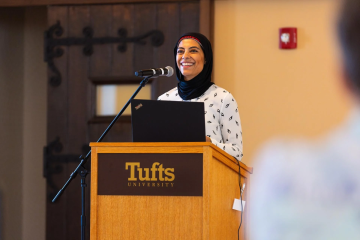
Perspectives on Anti-Muslim, Anti-Arab, and Anti-Palestinian Bias
An advocate and a scholar discuss the roots of discrimination and share strategies for addressing it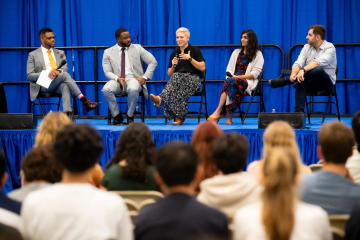
Difficult Conversations, Healthy Dialogue, and Keeping an Open Mind
A panel discussion with four recent alumni gives incoming students perspectives on choices they will face in college and beyond.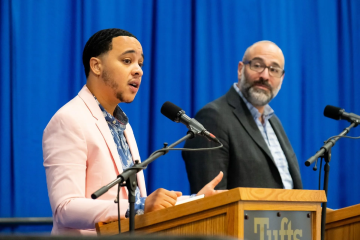
A Time to Talk About Antisemitism
A workshop for students kicks off a series of university conversations on confronting bias and prejudice.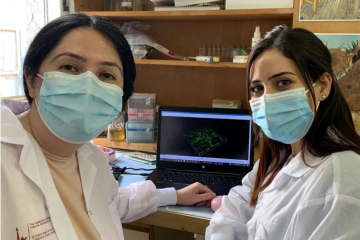
Science Education to Bridge Divides in the Middle East
Program co-founded by Tufts professor pairs Palestinian and Israeli graduate students to work together toward their degrees